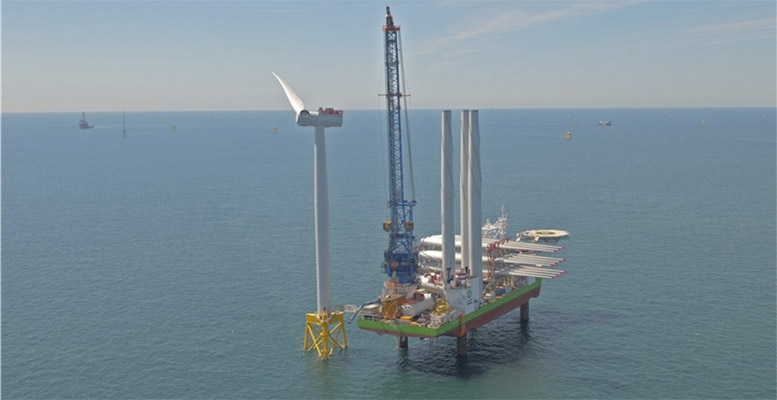Iberdrola has increased its ambition in the offshore wind industry, following the conclusion of an agreement to take 100% ownership of Ailes Marines. The company is developing, constructing and operating the Saint-Brieuc offshore wind farm in France, a country that has become an increasingly strategic market for the Iberdrola.
Iberdrola, which previously owned 70% of the consortium’s capital, has acquired the remaining 30% from Avel Vor, after receiving the green light from the French Ministry of the Economy.
The transaction will add momentum to the project, which is scheduled to begin construction in 2021. Once fully operational in 2023, the installed capacity of 496 megawatts will produce enough clean energy to satisfy the needs of around 835,000 consumers.
Jonathan Cole, Iberdrola’s Global Managing Director for offshore wind, said:
“The Saint-Brieuc project is now ready to get started on construction. All agreements are in place, the funding is secured and contracts are signed. Our detailed Industrial Plan will also support new factories and highly-skilled clean energy jobs in France. We are hoping that the final legal and administrative matters will be concluded quickly, and then this major €2.4 billion investment in a cleaner energy future will be ready to run full speed.”
Located approximately 16 kilometres off the coast of Brittany, the Saint-Brieuc plant will require an overall investment of around €2.4 billion. It will be equipped with 62 Siemens Gamesa wind turbines, each with an 8 MW capacity, installed in a 75-square-km area. The turbines will have a total height of 207 metres.
Saint-Brieuc is a key project for the energy transition and the French government’s fight against climate change.
Iberdrola is also active in the energy commercialisation market and is analysing new opportunities in onshore wind in France.
Iberdrola, a steadfast commitment to offshore wind power
Nearly twenty years after pioneering the move into onshore wind, Iberdrola now continues to spearhead the development offshore wind, a market with significant global potential. It currently has a project pipeline of circa 12.4 GW (gigawatts) in three main areas: the North Sea, the Baltic Sea and the United States.
With €13.26 billion (39%) out of Iberdrola’s total €34 billion global investment plan up to 2022 earmarked for renewables, offshore wind is a cornerstone of the company’s strategy.
The group is currently operating three offshore wind farms: West of Duddon Sands, which began operations in the Irish Sea in 2014, and Wikinger, in the German waters of the Baltic Sea, operational since December 2017.
In the United Kingdom, the company’s largest project to date, East Anglia ONE, is now also generating power and nearing completion. Around 80% of the wind turbines (82 of 102) are now installed. Once completed, the 714 MW of installed capacity will be capable of powering 630,000 UK homes for an investment of £2.5bn.
Iberdrola has also announced the development of East Anglia Hub, a macro-complex comprising the company’s three remaining projects in the North Sea: East Anglia One North, East Anglia Two and East Anglia Three. With 3,100-MW installed capacity, it will require an investment of around £6.5bn and the construction phase, expected to take around four years, will start in 2022. The main suppliers will be announced within the next ten months.
Iberdrola is also preparing to begin construction of the largest commercial offshore wind farm in the United States: Vineyard Wind. Off the coast of Massachusetts, it will have 800 MW capacity to cover the energy needs of one million homes. Additionally, in December 2019, it was awarded the contract to build Park City, an 804-MW facility off the Connecticut coastline to the south of Martha’s Vineyard and Nantucket.
In Germany, in April 2018, the company was awarded contracts to build two new plants in the Baltic Sea, with a joint capacity of 486 MW: Baltic Eagle and Wikinger South.
The company expects to be operating 2,000 MW of offshore wind in late 2022 and 3,000 MW by 2024





